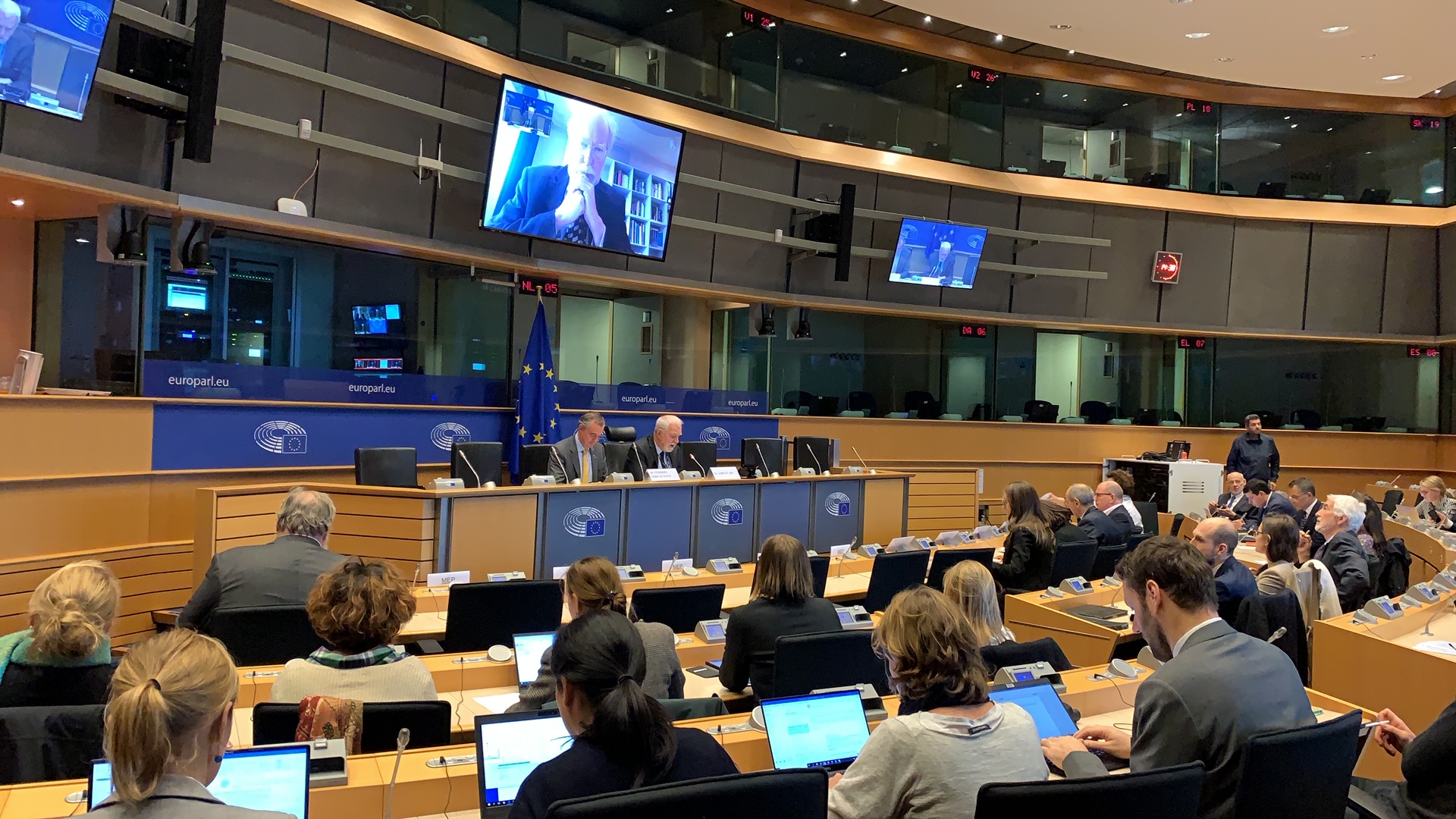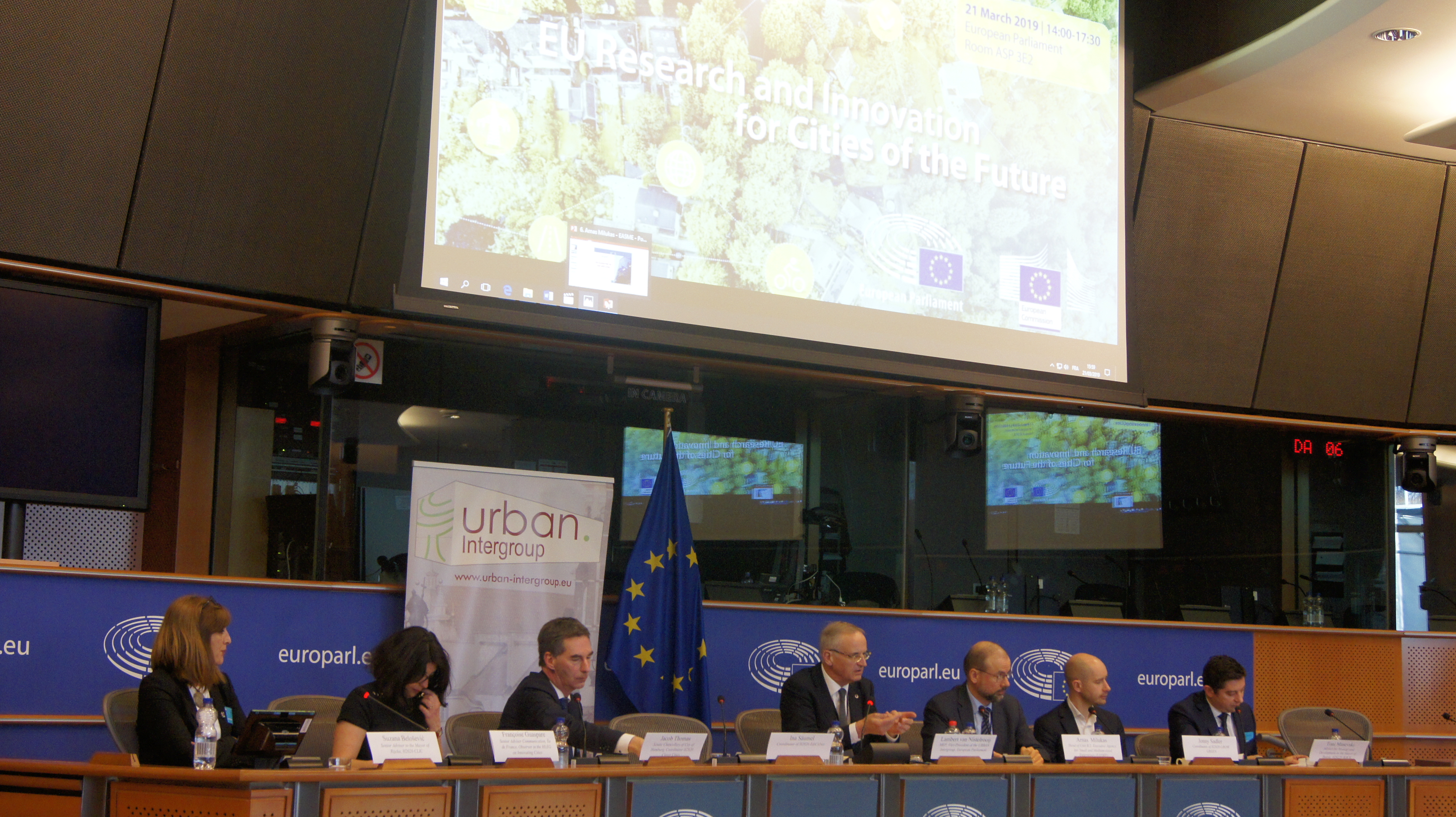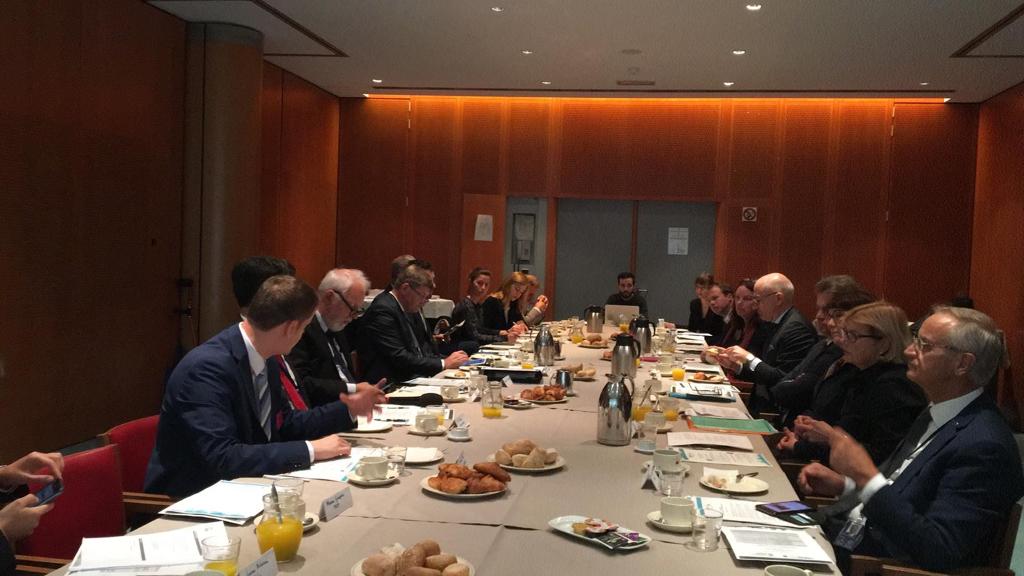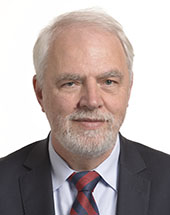High level policy session on urbanization and development
 URBAN Intergroup held a high-level policy session on 11 November 2019 to explore reasons why sustainable urbanization was critical for development. It was co-organized by the European Commission and UN-Habitat.
URBAN Intergroup held a high-level policy session on 11 November 2019 to explore reasons why sustainable urbanization was critical for development. It was co-organized by the European Commission and UN-Habitat.
The event brought together Members of the European Parliament, European Union Member State representatives, European Commission staff, UN agencies, development partners, think tanks and prominent thought leaders in global academia to discuss practicable recommendations and tools in using sustainable urbanization as driver of development.
Mr. Jan Olbrycht, Member of the European Parliament (MEP) set the stage by introducing the background to this policy session as originating from the pilote project “Supporting the Urban Dimension of Development Cooperation: Increasing financial capacities of cities from developing countries to deliver productive and sustainable urban development”. This project was requested by the European Parliament, financed by the European Union and implemented by UN-Habitat. He highlighted the urgent need to take the SDGs seriously instead of allowing the word sustainable become meaningless terminology.
This notion was re-emphasized by Mr. Felix Fernandez-Shaw, Director, Policy, Directorate-General for International Cooperation and Development of the European Commission (DG DEVCO), who reminded the audience that the urban dimension is relevant to all of the seventeen Sustainable Development Goals, not only the dedicated goal SDG 11. Similarly, the priorities of the new European Commission president Ursula von der Leyen (Green Deal, Digital Technologies, Sustainable Growth and Jobs, Migration, Governance, Peace and Security) were all closely linked to developments in cities. He explained that the policy session event took place at an important moment, as the European Union is currently programming its next budget in the Multi-Annual Financial Framework 2021-27, and DG DEVCO prioritises geographical regional and country-level programmes, where sustainable urbanisation features as an important driver.
With special reference to Africa, key note speaker Sir Paul Professor Collier, CBE Fellow of the British Academy, University of Oxford, emphasized the need for effective investment in urbanization as a crucial driver for development and economic growth. “A good city puts in place physical and institutional infrastructure to attract firms,” he said, emphasizing that harnessing urbanization is the key prerequisite for African cities to become engines for productivity and livability. He underlined the urgency of investing in cities as Africa undergoes a surge of population growth and urbanization, and the need for investment is already enormous, hence if not undertaken now it will become completely unaffordable due to much higher costs of retrofitting the physical infrastructure to urban areas.
EU Research and Innovation for Cities of the Future

The joint event organised by the URBAN Intergroup and the European Commission’s Directorate General for Research and Innovation (DG RTD) on “EU Research and Innovation for Cities of the Future” took place on Thursday afternoon 21st of March 2019 at the EP in Brussels.
This big event showed how EU Research and Innovation actions are driving sustainable urban development to address major urban challenges. The objectives of the event were to present the main highlights of the draft High-Level Expert Group report on “Innovating Cities” and to invite participants for comments. Moreover, the participants got the possibility to learn more about the substantial contribution of EU funded Research and Innovation projects /initiatives /actions to knowledge-base and innovative solutions for sustainable cities.
The joint event mobilised R&I communities, members of the European Parliament, city leaders and policy makers, academia, the private sector, industrials, innovation firms, NGOs, the civil society, European institutions and UN agencies representatives.

Digital public services for age-friendly cities and communities

The URBAN Intergroup and the Intergroup on Active Ageing, Intergenerational Solidarity and Family policies jointly organised an event on co-creation of digital public services, in the framework of the Horizon2020 project Mobile-Age, which took place on 29 January 2019 at the European Parliament in Brussels.
Members of the European Parliament, representatives of the European Commission, local politicians and academia provided some highlights on common challenges and solutions for conceiving urban and rural planning with the lens of age-friendly concepts and practices. The event was also an occasion to share tools and insights paving the way to European strategies putting citizens’ needs on the agenda of European policies.
The Horizon2020-funded Mobile-Age project, together with older persons, local governments, social care service providers, and researchers, has developed and tested a co-creation methodology and a set of practical and accessible mobile applications in pilot sites across Europe (Bremen, South Lakeland, Zaragoza and Region Central Macedonia).
Lambert Van Nistelrooj welcomed the Mobile-Age’s approach based on co-creation: “considering the social dimension is key, we may be technology-driven, but we need to step back and use a more participatory approach”. As Chair of the Intergroup on Active Ageing, Mr. Van Nisterlrooj underlined that “this is something we – at both the URBAN Intergroup and the Intergroup on Active Ageing, Intergenerational Solidarity and Families issues- value a lot”.
Closing the event, Jan Olbrycht, President of the URBAN Intergroup, underlined that “as politicians, we must think about what can we do for the people, how we can improve their lives by reinforcing trust and using trustworthy technology.” As Chair of the URBAN Intergroup, he expressed his satisfaction on the event: “I am very happy of our deep and optimistic debate with Age Platform and Mobile-Age at the European Parliament. We did not speak about technology, but mainly about people! Firstly, we need to identify people’s needs by working with them. We then need to identify issues and concerns that affect people most, in order to meet their expectations. Only then, accessibility to different services in cities should be improved. This is the positive approach presented by the MobileAge project!”
Discussion on how emerging technologies and real estate can help European cities

The recent conference ‘Innovation, Technology and Real Estate: building cities for Europe’s future’ was organised by the URBAN Intergroup and INREV. It took place on Tuesday the 4th of December in Brussels.
In his opening speech, Jan Olbrycht, President of the URBAN Intergroup, emphasized the importance of integrated, rational urban planning if we are to meet the challenges facing cities. “It’s not possible to have long-term real estate investment without a stable legislative and political system” – said Olbrycht. It was followed by several presentations explaining the role that technology and real estate can play in improving the quality of life in cities.
The first presentation made by a representative of ULI (the Urban Land Institute) explained the challenges facing cities such as increasing density, congestion and aging populations and underlined some of the growth trends in urban areas.
A leader of the URBAN Air Mobility (UAM), within the Sustainable Urban Mobility Action Cluster of the EIP-SCC (European Innovation Partnership, Smart Cities and Communities), illustrated their vision of smart cities and how urban air mobility and electric flying vehicles, which are developing rapidly, can help address some of these challenges. As there is a significant disconnect between urban planning and new technology, a strong call was made for a more integrated approach. Moreover, the need for urban planners to take into account the “fourth” dimension of urban mobility (not only walk, ride, bike but also fly) was underlined.
Discussion with Partnership for Urban Mobility
 Members of the URBAN Intergroup had a chance to discuss with members of the Partnership for Urban Mobility of the Urban Agenda on the 9th of October at the European Parliament in Brussels. This breakfast meeting was an occasion for the representatives of the Partnership to present the results of their work ahead of the adoption of their Action Plan. Members of the Partnership called for the reinforcement of multi-level cooperation and governance and better uptake of sustainable urban mobility planning.
Members of the URBAN Intergroup had a chance to discuss with members of the Partnership for Urban Mobility of the Urban Agenda on the 9th of October at the European Parliament in Brussels. This breakfast meeting was an occasion for the representatives of the Partnership to present the results of their work ahead of the adoption of their Action Plan. Members of the Partnership called for the reinforcement of multi-level cooperation and governance and better uptake of sustainable urban mobility planning.
In the area of public transport, an evaluation of best practices in facilitating access to public transport and a scaling up of innovative clean busses were underlined. The Partnership advocated for the development of active modes of transport and the use of public space: it prescribed to develop guidelines on infrastructure for an active mobility supported by relevant funding, by promoting sustainable and active mobility behaviour and finally by reducing the diversity of Urban Vehicle Access Regulations. Moreover, members of the Partnership argued that there is a need to explore the development of New Mobility Services and to set up a European framework for fostering urban mobility innovation.
“What surprises me is that your actions are very concrete! You are, as practitioners, a part of the European project and you deal with the core problems that the EU cities must tackle” – said during the discussion Lambert van Nisterlooij (EPP, the Netherlands), Vice-President of the URBAN Intergroup. Dr Frank Mentrup, Lord Mayor of Karlsruhe, underlined that “urban mobility is not only about tackling climate issues but has an important social impact” by pulling out people from poverty.
Peter Simon (S&D, Germany), member of the Intergroup, noted that local authorities need to have a serious debate with representatives of industry in order to plan new mobility services and different types of interconnections within urban areas. Jan Olbrycht (EPP, Poland) added in this context that other cities can learn how to deal with industry thanks to the best practices collected by the Partnership.



